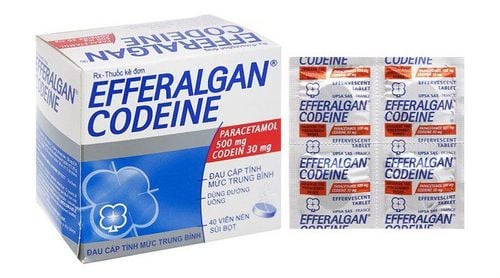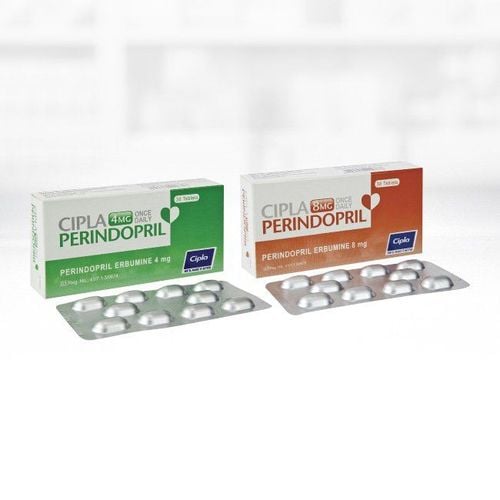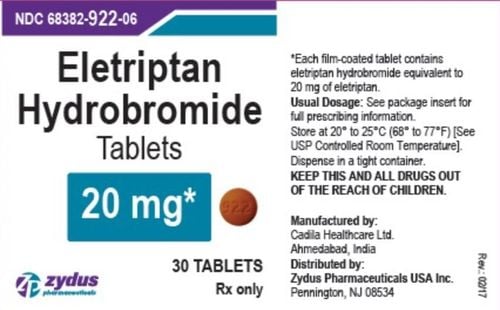This is an automatically translated article.
The drug Chlorpes has two main active ingredients, Clonidine and Chlorthalidone, which are used in the treatment of high blood pressure. The article will provide information about the uses, dosage and notes when using Chlorpes.1. What is Chlorpres?
Chlorpes has two main ingredients, Clonidine and Chlorthalidone used in the treatment of hypertension. High blood pressure adds to the workload of the heart and arteries. If the condition continues for a long time, the heart and arteries may not work properly. This will affect the blood vessels of the brain, heart, and kidneys, leading to stroke, heart failure, or kidney failure.
Clonidine works by controlling nerve impulses along the body's nerve pathways. It also helps to dilate blood vessels. Chlorthalidone is a diuretic, which helps reduce the volume of fluid in the body by increasing urine flow.
2. Dosage of the drug Chlorpes
The dose of Chlorpes will be different for each patient. The following is a reference dose of Chlorpes when treating high blood pressure:
Adults: Take 1 tablet once or twice a day. Children: Use and dosage must be determined by a pediatrician. If the patient misses a dose of this medicine, take it as soon as possible. However, if it is almost time for your next dose, skip the missed dose and go back to your regular dosing schedule.
3. What are the side effects of Chlorpes?
Patients using Chlorpes may experience side effects including:
Common: Constipation, dizziness, drowsiness, dry mouth, unusual tiredness or weakness Uncommon: Decreased libido, diarrhea, dizziness or lightheadedness when getting up from a lying or sitting position, dry, itchy or burning eyes, increased skin sensitivity to sunlight, loss of appetite, nausea or vomiting, anxiety, pain stomach Contact your doctor right away if any of the following side effects occur:
Signs and symptoms of overdose: Shortness of breath, dizziness or fainting, feeling cold, slow heartbeat, fatigue or unusual weakness Signs and symptoms of too much potassium loss: Dry mouth, increased thirst, irregular heartbeat, mood or mental changes, muscle cramps or pain, nausea or vomiting, weak pulse Signs and symptoms of too much sodium loss: seizures, decreased mental activity, irritability, muscle cramps, unusual tiredness or weakness
4. Notes when using Chlorpes
Inform the doctor if the patient has ever had any allergic reaction to this or other medicines. Children: Studies on Chlorpes have been performed only in adult patients. However, children may be more sensitive than adults to Clonidine. Overdosage of Clonidine has been reported when children have accidentally taken this medicine. Elderly: Dizziness or lightheadedness and signs of too much potassium loss may be more likely to occur in the elderly, who are more sensitive to the effects of Clonidine and Chlorthalidone. Lactation: There are no adequate studies to determine the infant risk when using this medicine during breast-feeding. Weigh the benefits against the possible risks before taking this medicine while breastfeeding. The presence of other medical problems may affect the use of Clorps. Tell your doctor if you have any of the following medical problems: Type 2 diabetes because Clorpres can change the amount of diabetes medicine needed Gout because Clorpres can increase the amount of uric acid in the blood. Blood heart or blood vessel disease, lupus erythematosus, mental breakdown, pancreatitis Raynaud's syndrome because Chlorpres can make these conditions worse Kidney disease: If kidney disease is severe, chlorthalidone can Inactive Liver Disease: If Clorpres causes too much water loss from the body, liver disease may get worse. Clorpres will not completely cure high blood pressure but help keep blood pressure at a target level. Therefore, patients must continue to take them as directed if blood pressure is to be lowered and maintained at target levels. Patients may need to take high blood pressure medication for the rest of their lives. If high blood pressure is left untreated, it can cause serious problems like heart failure, blood vessel disease, stroke, or kidney disease. To help remember to take your medicine, try to get in the habit of taking it at the same time each day. Chlorpres will increase the effects of alcohol and other central nervous system (CNS) depressants. Some examples of CNS depressants are antihistamines or medicines for colds or allergies, tranquilizers, sleeping pills, prescription pain relievers, epilepsy medicines, muscle relaxants, or anesthetic. Chlorpres may cause some people to become drowsy or less alert than they are normally. Therefore, patients need to be cautious when driving, using machines or doing tasks that require alertness. Dizziness, lightheadedness, or fainting may occur, especially when the patient gets up from a lying or sitting position. Standing up slowly can help, but if the problem continues or gets worse, see your doctor. Dizziness, lightheadedness, or fainting are also more likely if the patient drinks alcohol, stands for long periods of time, exercises, or is in hot weather. Drinking alcohol can also make sleepiness worse. While you are taking this medicine, limit your alcohol intake. Chlorpres can cause a loss of potassium in the body. To help prevent hypokalemia, patients can increase their intake of foods that are high in potassium (eg, oranges or other citrus juices), and take a potassium supplement. Check with your doctor if the patient is sick, vomiting, or has severe diarrhea. These problems can cause the patient to lose extra water and potassium. Chlorthalidone contained in Chlorpres may increase blood sugar. While you are taking the medicine, be sure to check your blood glucose level or check your urine sugar. Chlorpres may make your skin more sensitive to the sun than usual. Exposure to sunlight, even for short periods of time, can cause skin rashes, itching, redness or skin discoloration, or severe sunburn. Patients should therefore wear protective clothing, including a hat, and apply a sunscreen with a skin protection factor (SPF) of at least 15. Clorpres may cause dry mouth. For temporary relief, patients can use sugar-free candy or gum, melt a little ice in their mouth, or use a saliva substitute. However, if the patient continues to experience increasingly severe dry mouth for more than 2 weeks, see a doctor or dentist. Persistent dry mouth can increase your risk of dental disease, including tooth decay, gum disease, and infections. Drug interactions
Drug interactions can affect the effectiveness of treatment or increase side effects. It is important for patients to inform their doctor or pharmacist of all medications they are taking for advice. The following are interactions to watch out for when using Clorps:
Using Clorps with any of the following medicines is generally not recommended, but may be required in some cases. If both medicines are prescribed together, your doctor may change the dose or frequency of one or both of them: Acebutolol, Amitriptyline, Amoxapine, Doxepin, Droperidol, Esmolol, Etodolac, Lornoxicam, Loxoprofen, Lumiracoxib. .. Using Clorps with medicines such as Mepivacaine, Naloxone, Cyclosporine, Warfarin can increase the risk of some side effects, but using both drugs may be the best treatment. If both medicines are prescribed together, your doctor may change how much or how often you use one or both medicines. Above is an overview of the drug Chlorpes. Patients should not self-medicate, but should consult a doctor or pharmacist for advice.













